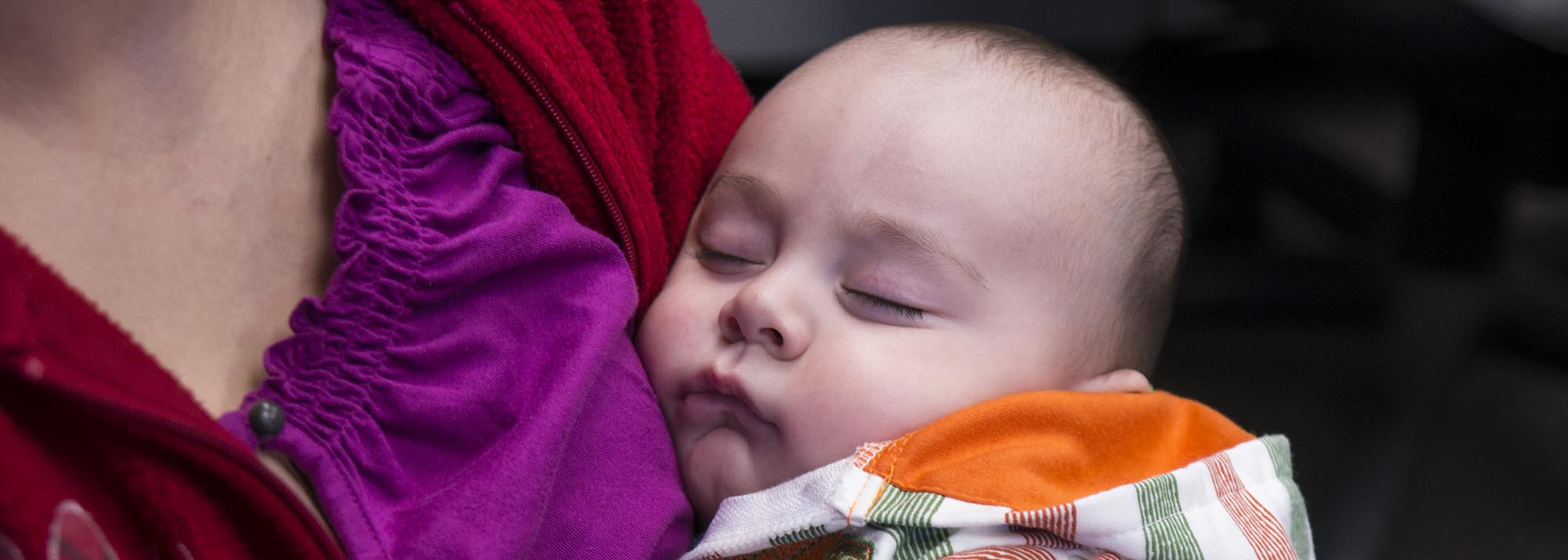Sudden infant death syndrome (SIDS) is the unexpected death of an infant within the first year of life. It is the leading cause of death in healthy infants. SIDS caused around 1,389 infant deaths in 2020.
An infection does not cause SIDS. Babies cannot catch or spread it. However, babies may be at a higher risk for SIDS if they were born prematurely or at a low birth weight. There is also an increased risk if the mother received poor prenatal care or smoked, drank or used drugs during pregnancy.
Sometimes infants who die from SIDS were born with an abnormality in the brain stem. That is the part of the brain that controls heart rate, breathing and waking.
There are no tests that can tell whether SIDS is going to happen and no way to eliminate its risk. But parents can help reduce the risk of SIDS and other sleep related causes of infant death.
Learn what you can do to help your baby sleep more safely.
Safe Infant Sleep Practices
Our women’s health team follows the guidance provided by the American Academy of Pediatrics (AAP) when we recommend safe sleep practices for babies up to 12 months of age, including:
- Place your baby on their back to sleep—not on their stomach or side. Remembering “back to sleep” at bedtime helps keep your baby safer.
- Use a firm sleep surface for sleep, such as a crib or bassinet. Make sure the one you choose meets the safety standards of the Consumer Product Safety Commission (CPSC), with an incline of 10 degrees of less, with a flat and rigid surface. Avoid soft or plush surfaces. Check to ensure there are no gaps larger than 2 fingers wide, or the baby’s head could accidentally get stuck. Any crib more than 10 years old or modified in any way should not be used.
- Share your room, not your bed. Instead, have your baby sleep nearby in the same room as you for the first year, if possible.
- Keep the sleep area clear of soft objects and cords. Remove blankets, pillows and toys while your baby is sleeping.
- Keep your baby cool and room well-ventilated. Too much bedding or clothing can cause overheating. Your baby may be too hot if they are sweating, or their chest feels hot.
- Offer a pacifier for naptime and bedtime. Pacifiers may help reduce the risk of SIDS because sucking on a pacifier can bring baby’s tongue forward, opening the airway a bit. In other cases, a pacifier doesn’t allow a baby to sleep as deeply, reducing the risk the baby stops breathing. Avoid using pacifiers attached to your baby’s clothing or other objects that may be a choking or suffocation risk.
- Remain awake on a sofa or cushioned chair while holding or feeding your baby. If you fall asleep during these activities, there is an increased risk of accidentally suffocating the baby.
Tips While Baby is Awake
Breastfeed if You Can
Breastfed babies have a lower risk of SIDS, because they wake up more easily than formula-fed babies. Breastfeeding babies also receive immune benefits, reducing their risk of respiratory infections such as Respiratory Syncytial Virus (RSV).
UNM Hospital is Baby-Friendly and we recommend breastfeeding for at least 12 months, when possible. Consultants are available if you have questions or would like breastfeeding support.
Answers to 5 Common Questions About Breastfeeding
Learning to breastfeed your baby takes practice and patience. It is normal to have questions, whether you are a first-time or veteran momRelated Reading
Attend Baby’s Well-Child Visits
Two or three days after you return home from UNMH, visit our newborn clinic for a postpartum checkup. Regular pediatrician visits also are important for healthy babies. Recent evidence suggests vaccines may have a protective effect against SIDS—no research suggests that vaccines can cause SIDS.
Our caring pediatricians partner with you to help your baby grow strong and healthy. For the first year, the American Academy of Pediatrics (AAP) recommends the following schedule for well-child care when your baby is:
- 1 week old
- 1 month old
- 2 months old
- 4 months old
- 9 months old
- 12 months old
Limit Secondhand Smoke
According to the Centers for Disease Control and Prevention (CDC), infants exposed to secondhand smoke have a greater risk for SIDS. Secondhand smoke contains chemicals that interfere with an infant’s breathing. Parents should avoid smoking during and after pregnancy. Ask others not to smoke in your home or near your baby.
Avoid Alcohol
Drinking alcohol can lead to poor decision-making, such as letting the baby sleep in an unsafe space. It can also make it harder to wake up and to control your movements, such as rolling over. It is especially important not to share your bed with the baby if you have been drinking.
Give Supervised Tummy Time
“Tummy time” is when you lay your baby on their stomach for a short time while you both are awake. Consistent tummy time helps the baby develop skills for sitting, rolling and crawling. It also helps to prevent flat head syndrome. Try for 3-5 minutes at a time, two or three times per day. Always stay with your baby during tummy time.
New Mom? Free Home Visits Give Your Family a Healthy Start in Life
Free Home Visits Give Your Family a Healthy Start in LifeRelated Reading
You and your baby’s health remain our top priority. If you have any questions or concerns about SIDS or how you can help reduce your baby’s risk, please call your doctor or midwife. We are always here to support you!

